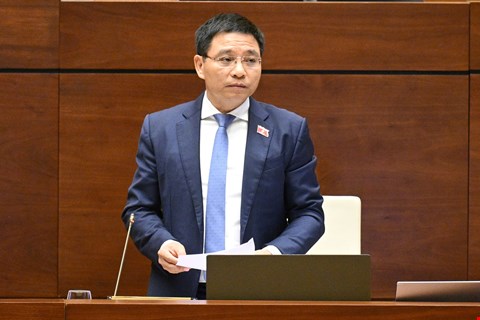Continuing the 9th Session, on May 20, the National Assembly discussed the draft revised Law on Enterprises.
Participating in contributing opinions, delegate Tran Thi Nhi Ha - National Assembly delegate (NAD) of Hanoi City - expressed her high consensus on many contents stated in the draft law.
However, the delegate said that the issue of amending regulations on private enterprises and business household models has not been included in this draft Law. Meanwhile, this is a key content identified in Resolution 68 of the Politburo on private economic development with very clear requirements, encouraging the conversion of business households to a business model, eliminating contract tax for business households no later than 2026.
Ms. Ha said that the private economic sector currently has more than 5 million business households and more than 940,000 enterprises. Business households have continued to increase steadily over the years because this model is applying a simple contract tax regime, not strictly managing accounting documents.
At the same time, the administrative penalty for business households is only half that of the enterprise model, creating inequality right in the private economic sector.
"A business with a revenue of only a few tens of millions to a few hundred million VND a year must also implement the regime of books, invoices, and corporate accounting documents.
However, many business households with a revenue of tens of billions of VND are only subject to tax contracts and still operate outside the legal framework of the Enterprise Law. This is an inadequate issue that needs to be addressed," said delegate Tran Thi Nhi Ha.

From the above practice, the delegate proposed that the Government should develop a roadmap to convert all business households to a business model associated with the deadline for abolishing contract tax in 2026.
At the same time, it is necessary to issue a new Law on Private Enterprises to replace the current model of both business households and private enterprises, to apply to small and micro business models.
According to the delegate, this law needs to be designed according to the principle of simple procedures, low cost, exemption from audits, exemption from periodic financial statements if revenue is below the prescribed threshold, applying personal income tax instead of contract tax, ensuring fairness and transparency.
"It is necessary to separate regulations on private enterprises from the Law on Enterprises and change their name to the Law on Companies to avoid applying a common legal framework to two completely different models of legal status and property liability," delegate Tran Thi Nhi Ha proposed.
Regarding the proposed content of the delegate, Minister of Finance Nguyen Van Thang said that the subjects of the current Enterprise Law are enterprises of the type of limited liability companies, joint stock companies, private enterprises and have not been applied to business households.
According to Minister Nguyen Van Thang, in the coming time, the Business Household Law may be issued to determine the legality, as well as the model of organizing activities for individual business households.

Regarding the policy of promoting business households to switch to the enterprise model, according to Minister Nguyen Van Thang, Resolution 68 of the Politburo has fully calculated solutions and measures to encourage qualified and capable business households to switch to the enterprise model.
"Such as the income tax exemption policy for newly established enterprises, support for land rent, reduce procedures... At the same time, with tightening management for business households in the direction of eliminating contract tax, implementing tax declaration and payment based on actual revenue, business households will realize that operating under the business model has more incentives and advantages," said Minister Nguyen Van Thang.








